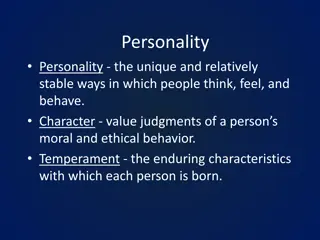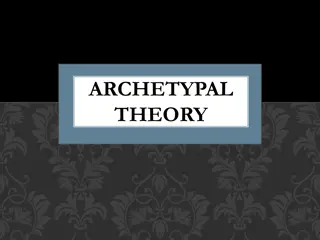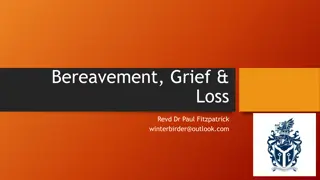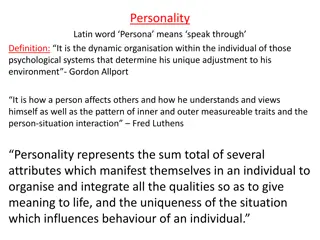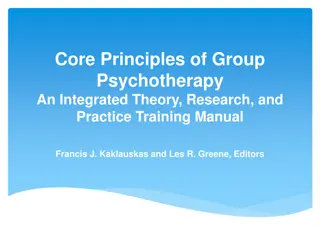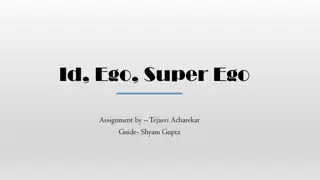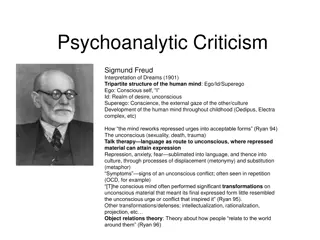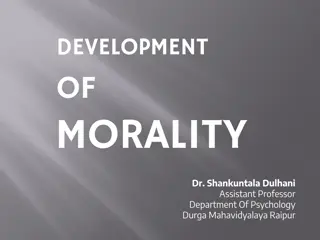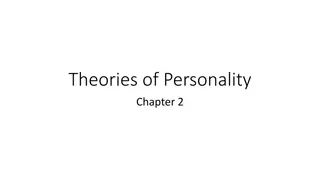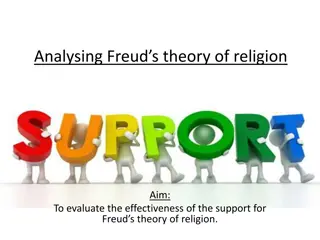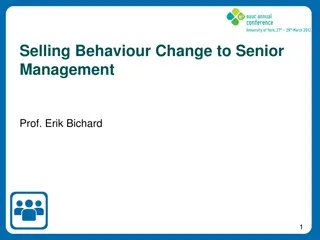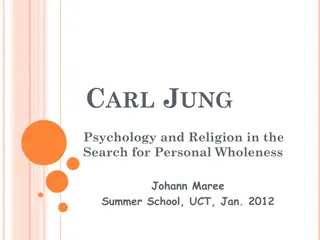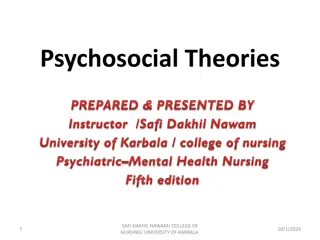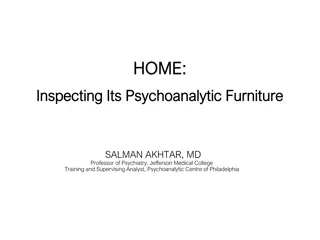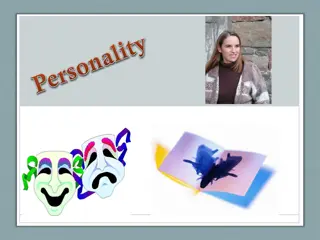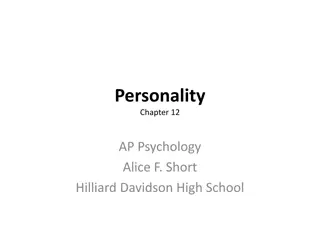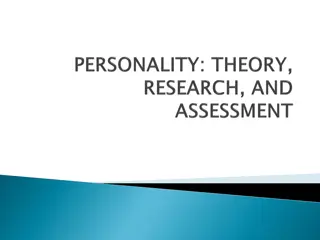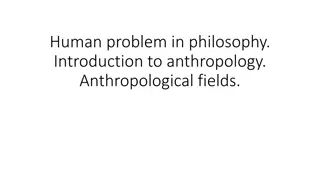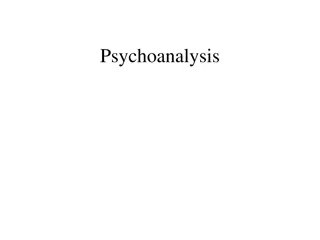Understanding Personality: Freud's Psychoanalytic Theory
Personality encompasses unique ways individuals think, feel, and behave. Sigmund Freud's psychoanalytic theory explores the divisions of consciousness, parts of personality (Id, Ego, Superego), and stages of personality development. Freud's theory delves into the role of unconscious thoughts, desire
3 views • 41 slides
Psychological Theories of Criminality: Understanding the Roots
Psychological theories of criminality delve into the association between intelligence, personality, learning, and criminal behavior. Major theories include Psychodynamic Theory by Freud, Behavioral Theory by Bandura, and Cognitive Theory by Kohlberg. These theories explore how unconscious mental pro
1 views • 20 slides
Exploring Archetypal Theory in Literature
Delve into the world of archetypal theory, rooted in the works of Sigmund Freud and Carl Jung. Uncover the significance of symbols and recurring figures in different cultures, as well as how traditional archetypes transcend genres and time periods. Understand the impact of archetypal characters, ima
0 views • 11 slides
Understanding Dreams: Exploring Theories and Meanings
Dreams have intrigued philosophers for centuries, with recent scientific research shedding light on their significance. While the purpose of dreams remains debated, various theories like Freud's psychoanalytic perspective offer insights into how dreams may be linked to our subconscious desires and t
0 views • 9 slides
Understanding Bereavement, Grief, and Loss: Historical Perspectives and Contemporary Models
Explore the concepts of bereavement, grief, and loss through the historical perspectives of Freud's Melancholia and Elizabeth Kubler-Ross's Stage Model. Understand the significance of these terms, their impact on individuals experiencing loss, and the evolution of grief and loss models over time.
0 views • 20 slides
Exploring Transformational Psychology Through History and Tradition
Transformational psychology delves into the spiritual and emotional transformation required for understanding psychology in the context of faith and relationship with God. It contrasts naturalistic approaches with the spiritual foundation, emphasizing the importance of combining science and psycholo
3 views • 17 slides
Understanding Personality: The Dynamic Organization Within Individuals
Personality, derived from the Latin word "Persona," encompasses the psychological systems shaping an individual's unique adjustment to the environment. It influences how a person interacts with others, perceives themselves, and displays a pattern of inner and outer traits. Personality integrates var
2 views • 10 slides
Moving Up!: Transition to Secondary School at Anna Freud National Centre for Children and Families
Experience the journey of four pupils as they navigate the challenges of starting secondary school with the help of Albie, Alisha, Dele, and Eliza. Discover how they overcome their worries and learn the importance of self-care for mental health and well-being. Watch online at the Anna Freud National
0 views • 14 slides
Evolution of Group Psychotherapy: A Historical Overview
Explore the rich history and key developments in group psychotherapy, from the early influences of Gustave LeBon and Sigmund Freud to pioneers like Joseph Pratt, Jacob Moreno, and Samuel Slavson. Delve into the mid-century contributions of A.S.H. Foulkes and Wilfred Bion, and the origins of cognitiv
2 views • 160 slides
Understanding the THRIVE Framework for System Change
The THRIVE Framework, developed in collaboration by the Anna Freud National Centre for Children and Families and the Tavistock and Portman NHS Foundation Trust, focuses on a needs-led approach, shared decision-making, and proactive prevention in supporting mental health and well-being for children a
1 views • 49 slides
Understanding Freud's Theory of Id, Ego, and Superego
Freud's psychoanalytic theory describes human personality as consisting of three elements - the id, ego, and superego. The id seeks immediate gratification, the superego represents internalized moral standards, and the ego mediates between them. A healthy balance among these components is crucial fo
0 views • 11 slides
Understanding Human Behavior: Insights for Social Workers
This material delves into the intricacies of human behavior, exploring factors influencing behavior such as heredity, environment, intelligence, needs, and motives. It covers the concept of human behavior, stages in life from conception to old age, and theories of human development by eminent psycho
2 views • 71 slides
Overview of Psychoanalytic Criticism and Object Relations Theory
Psychoanalytic Criticism, originating with Sigmund Freud and further developed by Melanie Klein and Jacques Lacan, explores the intricate workings of the human mind, delving into the tripartite structure of the ego, id, and superego. The theory encompasses concepts such as the interpretation of drea
0 views • 10 slides
Insights into "The Strange Case of Dr. Jekyll and Mr. Hyde" by Robert Louis Stevenson
Explore the intriguing background and themes behind Robert Louis Stevenson's famous novella, including the duality of human nature, Victorian England's societal norms, and the influence of contemporary ideas such as Charles Darwin's theory of evolution and Sigmund Freud's psychoanalytic concepts. Di
0 views • 10 slides
Understanding Moral Development: Insights and Perspectives
Morality is the belief in right behavior accepted by society. It involves moral behavior, feelings, and judgments. Moral development evolves from childhood to adulthood, influenced by experiences and challenges. Freud's id, ego, and superego theory and Skinner's behaviorism contribute to our underst
0 views • 12 slides
Overview of Freud's Psychodynamic Theories of Personality
This content delves into Freud's psychodynamic theories of personality, highlighting the ID, Ego, and Superego as key components. It discusses how early childhood experiences shape adult personality, the functions of each structure, and how they interact to influence behavior. The concept of defense
0 views • 34 slides
Critique of Freud's Theory of Religion: Examining Evidence and Key Criticisms
The analysis delves into Sigmund Freud's theory of religion, evaluating its support and challenges. The presentation highlights key criticisms regarding historical, anthropological, and psychological evidence, as well as Freud's conclusions on religion. Critiques focus on the lack of evidence for co
0 views • 19 slides
Understanding and Influencing Human Behavior for Effective Policy Change
In this content, various aspects of human behavior, denial, anxiety, confusion, and common reasons for inaction are discussed in the context of policy and behavior change. The importance of understanding human decision-making processes and the need to change the context to drive behavioral change ar
0 views • 36 slides
Understanding Carl Jung's Analytical Psychology and Relationship with Freud
Providing insights into Carl Jung's life and analytical psychology, including his challenging relationship with Freud as well as key concepts like the sexual instinct and libido. Explore Jung's evolving ideas that formed the basis for his search for personal wholeness through psychology and religion
0 views • 35 slides
Overview of Psychoanalytic Theories in Psychiatric Mental Health Nursing
Explore the fundamental beliefs and treatment modalities of psychosocial theories such as psychoanalytic, developmental, behavioral, existential, and crisis intervention. Learn about the influence of these theories on current nursing practices, with a focus on the foundational contributions of Sigmu
0 views • 40 slides
Reflections on the Significance of Home in Psychoanalytic Theory
Explore the intricate connections between the concept of 'home' and psychological well-being through the lens of psychoanalytic theory. From Freud's views on the symbolic nature of home to Winnicott's emphasis on the role of the environment in shaping one's sense of security, delve into the profound
0 views • 10 slides
Understanding Personality: Theories and Perspectives
Personality is a dynamic psychological concept shaped by internal needs, cognitive processes, and external influences. Psychodynamic and humanistic theories offer insights into different aspects of personality, while clinical and social-cognitive perspectives contribute to our understanding. Freud's
0 views • 26 slides
Understanding Personality Through Psychodynamic Perspectives
Personality is a complex pattern of enduring thoughts, emotions, and behaviors that shape how individuals adapt to the world. The psychodynamic perspective, pioneered by Sigmund Freud, delves into the unconscious mind and early experiences to understand personality development. Freud, known as the f
0 views • 64 slides
Understanding Personality: The Freudian Perspective
Personality refers to an individual's unique behavioral traits, which can be categorized into specific traits like openness, conscientiousness, extraversion, agreeableness, and neuroticism. Various theories, including Freud's psychoanalytic theory, attempt to explain personality by focusing on uncon
0 views • 24 slides
Understanding Human Nature Through Philosophy and Anthropology
Explore the different perspectives on human nature through philosophy and anthropology, from ancient Greek philosophers like Aristotle to modern thinkers like Freud and Sartre. Delve into the intersections of theology, psychology, and cultural relativism in shaping our understanding of what it means
0 views • 12 slides
Understanding Psychoanalysis: Unconscious Dynamics and Mental Health
Psychoanalysis, as pioneered by Sigmund Freud, delves into the dynamic interactions between the conscious mind and the unconscious, exploring hidden conflicts, desires, and fears. By examining symptoms, dreams, and neuroses, psychoanalysis seeks to bring repressed memories and concerns into consciou
0 views • 28 slides
Enhancing Mental Health Funding: Insights and Examples from The National Lottery Community Fund
Explore the funding initiatives led by Ruth Stephens, the Funding Manager for Mental Health at The National Lottery Community Fund. Discover their focus on mental health projects, funding priorities, and key factors considered when selecting projects. Learn about examples of funded initiatives like
0 views • 7 slides
